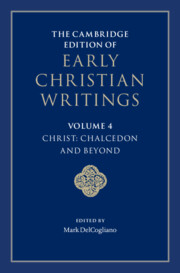Book contents
- The Cambridge Edition of Early Christian Writings
- The Cambridge Edition of Early Christian Writings
- The Cambridge Edition of Early Christian Writings
- Copyright page
- Contents
- Notes on Contributors
- Acknowledgments
- Note on the Texts and Translations
- Abbreviations
- Series Introduction
- Introduction
- Part I The Council of Chalcedon and Its Reception
- 1 Acts of the Home Synod at Constantinople (November 448):
- 2 Eutyches, Letter to Leo of Rome
- 3 Leo of Rome, Tome to Flavian of Constantinople
- 4 Acts of the Council of Chalcedon (October 451):
- 5 Leo of Rome, The Second Tome (Letter to Emperor Leo)
- 6 Timothy Aelurus, Petition to Emperor Leo
- 7 Timothy Aelurus, Against the Council of Chalcedon
- 8 Timothy Aelurus, Letter to Claudianus
- 9 Emperor Zeno, The Henotikon
- 10 Pseudo-Dionysius the Areopagite, Fourth Letter
- 11 Narsai, Metrical Homily on “the Word became Flesh” (John 1:14)
- 12 Narsai, Selections from the Metrical Homilies on the Nativity and on the Epiphany
- 13 Philoxenos of Mabbug, Letter to the Monks of Senoun (Selections)
- 14 Jacob of Serugh, Metrical Homilies on the Name “Emmanuel” and on How the Lord is Known in Scripture as Food and Drink
- 15 Jacob of Serugh, Metrical Homily on the Council of Chalcedon
- 16 Jacob of Serugh, Letter 14
- 17 Simeon of Beth Arsham, Letter on Bar Ṣawmā and the Heresy of the Nestorians
- 18 Emperor Justinian, Edict on the Orthodox Faith (Selection)
- 19 Acts of the Second Council of Constantinople (May–June 553):
- Part II Christological Perspectives after Constantinople II
- Suggestions for Further Reading
- Scriptural Index
12 - Narsai, Selections from the Metrical Homilies on the Nativity and on the Epiphany
from Part I - The Council of Chalcedon and Its Reception
Published online by Cambridge University Press: 11 February 2022
- The Cambridge Edition of Early Christian Writings
- The Cambridge Edition of Early Christian Writings
- The Cambridge Edition of Early Christian Writings
- Copyright page
- Contents
- Notes on Contributors
- Acknowledgments
- Note on the Texts and Translations
- Abbreviations
- Series Introduction
- Introduction
- Part I The Council of Chalcedon and Its Reception
- 1 Acts of the Home Synod at Constantinople (November 448):
- 2 Eutyches, Letter to Leo of Rome
- 3 Leo of Rome, Tome to Flavian of Constantinople
- 4 Acts of the Council of Chalcedon (October 451):
- 5 Leo of Rome, The Second Tome (Letter to Emperor Leo)
- 6 Timothy Aelurus, Petition to Emperor Leo
- 7 Timothy Aelurus, Against the Council of Chalcedon
- 8 Timothy Aelurus, Letter to Claudianus
- 9 Emperor Zeno, The Henotikon
- 10 Pseudo-Dionysius the Areopagite, Fourth Letter
- 11 Narsai, Metrical Homily on “the Word became Flesh” (John 1:14)
- 12 Narsai, Selections from the Metrical Homilies on the Nativity and on the Epiphany
- 13 Philoxenos of Mabbug, Letter to the Monks of Senoun (Selections)
- 14 Jacob of Serugh, Metrical Homilies on the Name “Emmanuel” and on How the Lord is Known in Scripture as Food and Drink
- 15 Jacob of Serugh, Metrical Homily on the Council of Chalcedon
- 16 Jacob of Serugh, Letter 14
- 17 Simeon of Beth Arsham, Letter on Bar Ṣawmā and the Heresy of the Nestorians
- 18 Emperor Justinian, Edict on the Orthodox Faith (Selection)
- 19 Acts of the Second Council of Constantinople (May–June 553):
- Part II Christological Perspectives after Constantinople II
- Suggestions for Further Reading
- Scriptural Index
Summary
In what follows, the fifth-century Syriac writer Narsai considers several moments from biblical stories in order to understand their significance for how Christians should think about Christ. Each of the vignettes Narsai discusses – the creation of humanity, an angel’s visit to Mary to announce her pregnancy, Jesus’s circumcision, and his baptism by John – offers a way to consider the purpose and nature of Christ as the Word of God. Throughout Narsai affirms the immutability of the Word even in the incarnation and stresses that it was the human being who was the subject of these biblical events, not the immutable Word of God. Narsai holds that the immutable Word did not literally became flesh in the incarnation (since that would be impossible for the Word), but rather indwelt the human being for the purpose of revealing knowledge of God. Narsai’s ideas about these situations and others frequently reflect the teachings of Theodore of Mopsuestia, a writer and church leader who died in 428 and whom Narsai revered. That said, his ideas also go beyond Theodore’s teachings, and show us the development of Christian thought about Christ from one generation to another.
- Type
- Chapter
- Information
- The Cambridge Edition of Early Christian Writings , pp. 214 - 238Publisher: Cambridge University PressPrint publication year: 2022



